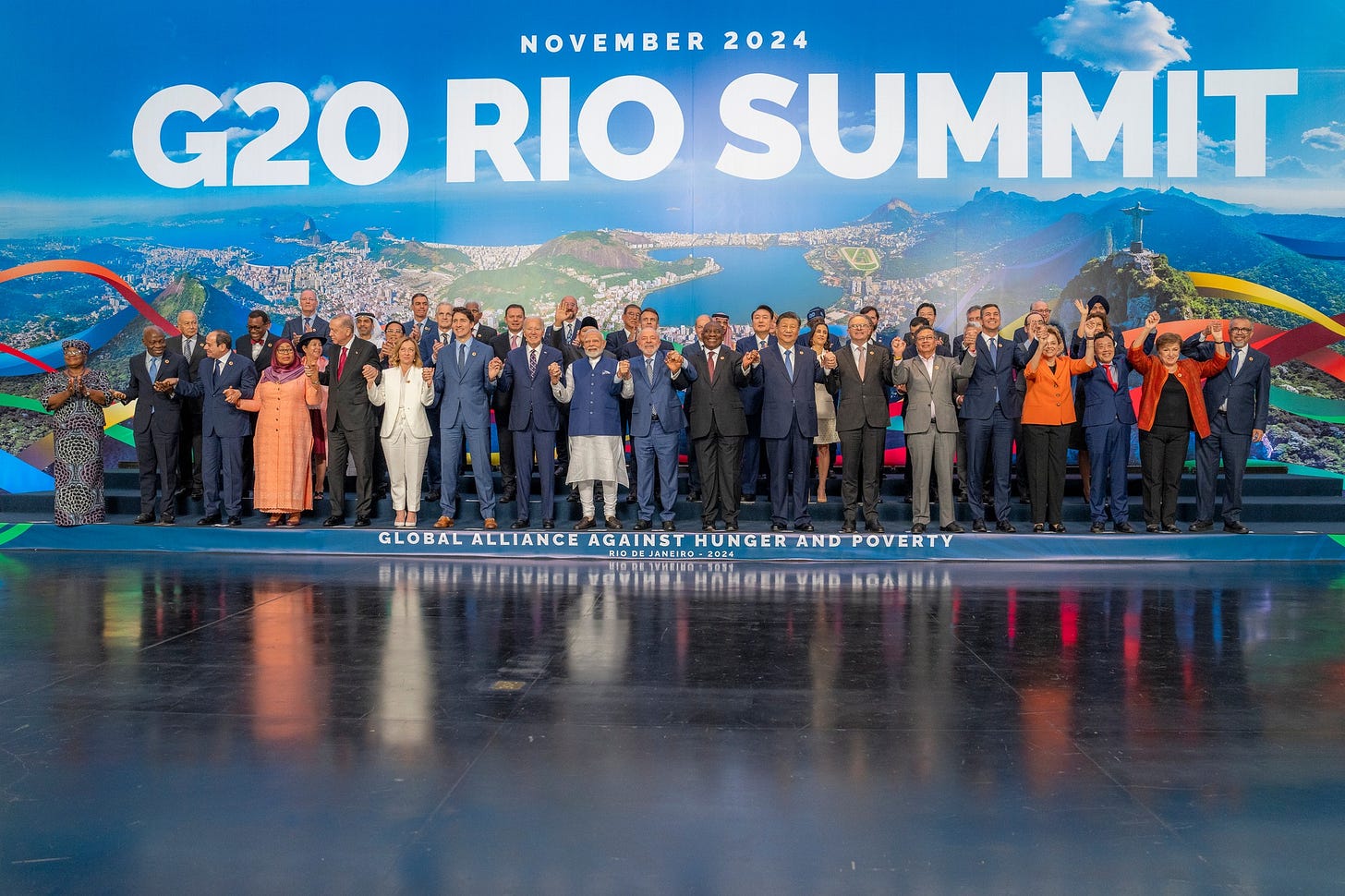The United States and Brazil have announced a new partnership to advance clean energy transitions, economic growth, job creation, and emissions reduction, all aligned with the Paris Agreement's 1.5°C goals. This collaboration leverages Brazil’s Nova Indústria policy, which focuses on strengthening industrial capacity and decarbonizing the economy, alongside the U.S.’s Inflation Reduction Act and Bipartisan Infrastructure Law, which aim to diversify clean energy supply chains and accelerate the adoption of clean energy technologies.
The partnership centers on three main pillars. First, it seeks to expand clean energy production and deployment by utilizing renewable resources such as wind, solar, and hydropower to decarbonize the power, transportation, and industrial sectors. Second, it focuses on advancing clean energy technology supply chains by promoting innovation, workforce training, and the development of technologies like clean hydrogen, sustainable batteries, and carbon management solutions. Third, the partnership emphasizes green industrialization by decarbonizing manufacturing and supply chains, attracting global investments, and positioning Brazilian and U.S. industries to compete effectively in a low-emissions global economy.
This initiative aims to align public and private sectors to create jobs, empower communities, and stimulate investment in climate resilience and deforestation mitigation. By integrating existing collaborations, including the U.S.-Brazil Energy Forum and the Climate Change Working Group, the partnership will enhance coordination between the two nations. Announced by Presidents Lula and Biden, the initiative underscores the commitment to mobilize resources and stakeholders across both countries to drive a just, inclusive, and sustainable energy transition.
From the start of his administration, President Biden has prioritized restoring U.S. leadership on the global stage, emphasizing partnerships to address cross-border challenges exacerbated by the pandemic. His leadership at the G20 has yielded significant achievements, including reforms in corporate taxation, the establishment of pandemic response funds, and unlocking resources for global development. Biden has pushed for increased concessional financing through the World Bank to aid developing nations and spearheaded multilateral development banks (MDBs) reforms to enhance their capacity to address climate change, pandemics, and economic fragility. He has also championed faster debt relief processes and sustainable growth pathways for nations burdened by unsustainable debt.
Biden has placed the global clean energy transition at the center of his agenda, launching initiatives like the Brazil-U.S. Partnership for the Energy Transition and increasing U.S. climate finance to over $11 billion annually. These efforts complement partnerships with countries like India and Kenya to develop green supply chains and accelerate clean energy industrialization. Additionally, the U.S. has reformed multilateral climate funds to increase their efficiency in addressing climate crises.
On global health, President Biden has prioritized pandemic preparedness and health equity. Under his leadership, the Pandemic Fund has awarded grants to over 75 countries to bolster their health systems. The U.S. has contributed to immunization initiatives, pledged billions to combat HIV/AIDS, tuberculosis, and malaria, and invested in addressing antimicrobial resistance (AMR). Biden has also emphasized the links between climate change and health, launching the National Heat Strategy and advancing climate-resilient health systems worldwide.
Food security and poverty alleviation have been key focuses, with the administration committing over $20 billion since 2021 to combat global hunger and launching the Global Alliance Against Hunger and Poverty. Efforts include reducing malnutrition, increasing women’s access to resources, and promoting sustainable agricultural practices. At the same time, Biden has advanced workers’ rights through initiatives like the U.S.-Brazil Partnership for Workers’ Rights, improving labor conditions and addressing forced labor in supply chains.
Biden’s vision for an equitable digital future includes leveraging artificial intelligence (AI) for sustainable development and expanding internet access through initiatives like the Women in the Digital Economy Initiative. These efforts aim to bridge the digital divide and ensure connectivity for underserved communities, particularly women. On global security, he has condemned Russia’s invasion of Ukraine and supported Israel’s right to self-defense while advocating for humanitarian considerations in Gaza. His leadership underscores a commitment to peace, economic growth, and sustainability, addressing pressing global challenges through diplomacy and innovation.
President Biden met with President Luiz Inácio Lula da Silva of Brazil during the G20 Summit in Rio de Janeiro to discuss the strategic relationship between the United States and Brazil, focusing on democracy, economic development, and climate action. President Biden congratulated President Lula on Brazil’s G20 host year and expressed support for his initiatives to combat hunger and poverty, emphasizing their commitment to ensuring inclusive development. They highlighted progress under the Partnership for Workers’ Rights, which empowers workers to participate in climate policy discussions and supports a just energy transition. President Biden also announced U.S. financing to expand Brazil’s fiber optic network, aiming to connect 1 million homes and 4,000 schools by 2027.
The leaders reaffirmed their commitment to democratic institutions and the rule of law domestically and globally. They discussed the situation in Venezuela, advocating for respect for democratic processes and an end to political repression. Addressing the security crisis in Haiti, they commended Kenya’s leadership and emphasized the need to transition the Multinational Security Support mission into a United Nations peacekeeping operation.
On climate action, both leaders underscored the urgency of addressing the global climate crisis as Brazil prepares to host COP30. President Biden expressed gratitude for Lula’s invitation to visit the Amazon and pledged U.S. support for Brazil’s Amazon Fund and the Tropical Forests Forever Facility. Additionally, they announced a new Brazil-U.S. Partnership for the Energy Transition, which will accelerate clean energy adoption, develop energy and mineral supply chains, and decarbonize industrial sectors. This builds on longstanding bilateral cooperation frameworks such as the U.S.-Brazil Energy Forum and the Strategic Minerals Dialogue.
The meeting reinforced the strong partnership between the United States and Brazil, rooted in shared goals of promoting democracy, advancing sustainability, and fostering economic progress.
The United States, Brazil, and now South Africa reaffirm their commitment to workers' central role in creating a sustainable, democratic, and equitable world. This partnership, aligned with the 2030 Agenda for Sustainable Development, aims to empower workers and unions globally to improve workplace conditions, economic fairness, and democracy.
Key achievements in the first year include:
Protecting workers from heat stress.
Combating forced labor.
Promoting inclusivity, worker safety, and racial justice.
Advancing a just green transition and high-quality investment for decent work.
Providing training, tools, and resources for workers and unions.
Future goals include:
Strengthening efforts to eliminate forced labor and its harms.
Promoting equal opportunities and combating workplace discrimination, harassment, and gender-based violence.
Enhancing workers' voices in clean energy transition through initiatives like labor agreements and social dialogue.
Empowering the next generation of union leaders.
The partnership acknowledges labor leaders as essential collaborators and calls on more nations to pursue global labor rights and decent work for all. Germany, Chile, and Spain are recognized for contributing to this initiative.
President Biden’s proclamation for National Child’s Day, 2024, highlights the immense potential of the current generation of children and underscores the nation’s dedication to creating opportunities for their growth and success. The proclamation details substantial educational investments, including $130 billion for K-12 schools through the American Rescue Plan, which expanded teacher staffing, counseling, tutoring, and summer/afterschool programs. The Bipartisan Infrastructure Law has improved access to high-speed internet, ensuring equitable digital resources for all students, while efforts are underway to provide free, healthy school meals to every child by 2030.
The proclamation also addresses support for families through the expansion of the Child Tax Credit, which has nearly halved child poverty nationwide. Additional measures include significant investments in child care, increased wages for early childhood educators in Head Start programs, and savings on health insurance premiums through the Inflation Reduction Act. Updates to the Supplemental Nutrition Assistance Program (SNAP) ensure families can access nutritious food.
Child safety and well-being are emphasized through the signing of the most significant gun safety law in 30 years and expanded youth mental health resources in schools. President Biden reaffirmed the administration’s commitment to protecting LGBTQI+ children and families by safeguarding access to health care and banning harmful practices such as conversion therapy. The proclamation also emphasizes addressing climate change with historic investments to combat pollution, ensure clean drinking water by replacing lead pipes, and conserve over 45 million acres of land and water for future generations.
On National Child’s Day, President Biden calls on all Americans to celebrate children’s potential and support their development into future leaders. Designating November 20, 2024, as a day of observance, he urges citizens to honor it with meaningful programs, ceremonies, and activities that champion the well-being and ambitions of the nation’s youth.
Group photo of the G20 participants in Rio De Janeiro






